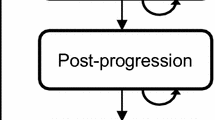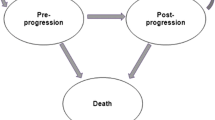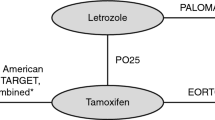Abstract
Goals of work
An economic evaluation was conducted comparing anastrozole, exemestane, letrozole and megestrol for the second-line treatment of postmenopausal patients with hormone-sensitive metastatic breast cancer who had failed tamoxifen.
Methods
An economic model was developed based on data from phase III megestrol-controlled clinical trials of antiaromatase agents (AA) and estimates of resource utilization from both Statistic Canada's Population Health Model for breast cancer and expert opinion.
Main results
In megestrol-controlled trials, anastrozole and exemestane equivalently improved survival compared to megestrol, while letrozole did not. Compared to megestrol, exemestane and anastrozole both cost Canadian $9000 per life-year gained, and letrozole saved Canadian $300 annually, with no life-year gain. Cost-effectiveness results were robust under sensitivity analysis testing. However, the model was dependent on any difference between AAs with respect to survival benefit and drug acquisition price.
Conclusion
Based on available data and this cost-effectiveness analysis, exemestane and anastrozole are appropriate choices for second-line hormonal treatment of metastatic breast cancer.

Similar content being viewed by others
References
Buzdar AU (2001) Endocrine therapy in the treatment of metastatic breast cancer. Semin Oncol 28:291–304
Buzdar A, Jonat W, Howell A, et al (1996) Anastrozole, a potent and selective aromatase inhibitor, versus megestrol acetate in postmenopausal women with advanced breast cancer: results of overview analysis of two phase III trials. J Clin Oncol 14:2000–2011
Buzdar AU, Jonat W, Howell A, et al (1998) Anastrozole versus megestrol acetate in the treatment of postmenopausal women with advanced breast carcinoma. Results of a survival update based on a combined analysis of data from two mature phase III trials. Cancer 83:1142–1152
Canadian Coordinating Office for Health Technology Assessment (1997) Guidelines for economic evaluation of pharmaceuticals: Canada, 2nd edn. CCOHTA, Ottawa
Dombernowsky P, Smith I, Falkson G, et al (1998) Letrozole, a new oral aromatase inhibitor for advanced breast cancer: double-blind randomized trial showing a dose effect and improved efficacy and tolerability compared with megestrol acetate. J Clin Oncol 16:453–461
Hillner BE, Radice D (2001) Cost-effectiveness analysis of exemestane compared with megestrol in patients with advanced breast carcinoma. Cancer 91:484–489
Kaufmann M, Bajetta E, Dirix LY, et al (2000) Exemestane is superior to megestrol acetate after tamoxifen failure in postmenopausal women with advanced breast cancer: results of a phase III randomized double-blind trial. J Clin Oncol 18:1399–1411
Laupacis A, Feeny D, Detsky AS, et al (1992) How attractive does a new technology have to be to warrant adoption and utilization? Tentative guidelines for using clinical and economic evaluations. CMAJ 146:473–481
Lindgren P, Jonsson B, Redaelli A, et al. (2002) Cost-effectiveness analysis of exemestane compared with megestrol in advanced breast cancer: a model for Europe and Australia. Pharmacoeconomics 20:101–108
Mouridsen H, Gershanovich M, Sun Y, et al (2001) Superior efficacy of letrozole versus tamoxifen as first-line therapy for postmenopausal women with advanced breast cancer: results of a phase III study of the International Letrozole Breast Cancer Group. J Clin Oncol 19:2596–2606
Mouridsen H, Gershanovich M, Sun Y, et al (2003) Phase III study of letrozole versus tamoxifen as first-line therapy of advanced beast cancer in postmenopausal women: analysis of survival and update of efficacy from the International Letrozole Breast Cancer Group. J Clin Oncol 21:2101–2109
National Cancer Institute of Canada. 1995 Canadian Cancer Statistics. National Cancer Institute of Canada, Toronto
Nuijten M, Meester L, Waibel F, et al (1999) Cost effectiveness of letrozole in the treatment of advanced breast cancer in postmenopausal women in the UK. Pharmacoeconomics 16:379–397
Nuijten M, McCormick J, Waibel F, et al (2000) Economic evaluation of letrozole in the treatment of advanced breast cancer in postmenopausal women in Canada. Value Health 3:31–39
Ontario Ministry of Health (1994) Ontario guidelines for economic analysis of pharmaceutical products. Ontario Ministry of Health, Toronto
Ontario Ministry of Health (1999) Schedule of benefits for laboratory services. Ontario Ministry of Health, Toronto
Ontario Ministry of Health (2000) Ontario drug benefit formulary—comparative drug index, version 36D. Ontario Ministry of Health, Toronto
Ontario Ministry of Health (2000) Schedule of benefits—physician services. February 1998, updated April 2000. Ontario Ministry of Health, Toronto
Rose C, Vtoraya O, Pluzanaka A, et al (2002) Letrozole vs anastrozole second line treatment in postmenopausal women with advanced breast cancer (abstract 131). American Society of Clinical Oncology, Orlando, Florida
Will PB, Berthelot J-M, Houle C, et al (1993) A model for estimating the costs and burdens of breast cancer diagnosis and treatment in Canada. Health Rep 5:399–408
Will PB, Berthelot J, Le Petit C, et al (2000) Estimates of the lifetime costs of breast cancer treatment in Canada. Eur J Cancer 36:724–735
Acknowledgements
The authors would like to acknowledge the contributions of Jean-Marie Berthelot, Statistics Canada, for providing access to POHEM; and Andy Willan, McMaster University, for survival extrapolation analyses.
Author information
Authors and Affiliations
Corresponding author
Additional information
This research was supported by a grant from Pharmacia Canada Inc.
Rights and permissions
About this article
Cite this article
Verma, S., Rocchi, A. Economic evaluation of antiaromatase agents in the second-line treatment of metastatic breast cancer. Support Care Cancer 11, 728–734 (2003). https://doi.org/10.1007/s00520-003-0502-4
Received:
Accepted:
Published:
Issue Date:
DOI: https://doi.org/10.1007/s00520-003-0502-4




